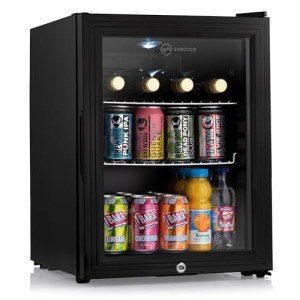The Importance of Temperature-Controlled Fridges in Various Industries
Temperature-controlled fridges are an essential element in different markets, including healthcare, food and beverage, pharmaceuticals, and laboratories. Silent Fridges specialized refrigerators are created to preserve a constant temperature level, which is important for keeping sensitive items, samples, and substances. In this short article, we will check out the different kinds of temperature-controlled fridges, their applications, and the benefits they offer.
What are Temperature-Controlled Fridges?
Temperature-controlled fridges, also referred to as accuracy refrigerators, are created to keep an exact temperature range. They are geared up with sophisticated temperature level control systems, which can be set to particular temperature levels, and are designed to decrease temperature fluctuations. These fridges are offered in numerous sizes, from small, compact units to big, walk-in designs.
Kinds Of Temperature-Controlled Fridges
There are several types of temperature-controlled fridges, each created for particular applications:
- Laboratory Refrigerators: These fridges are developed for lab settings and are normally utilized to store biological samples, vaccines, and other temperature-sensitive products.
- Pharmaceutical Refrigerators: These fridges are designed for keeping pharmaceutical products, consisting of medications, vaccines, and other temperature-sensitive substances.
- Medical Refrigerators: These fridges are designed for medical settings and are generally used to store medical products, including vaccines, blood, and other temperature-sensitive products.
- Food and Beverage Refrigerators: These fridges are designed for food and beverage applications, including restaurants, cafes, and catering services.
- Industrial Refrigerators: These fridges are developed for commercial applications, consisting of food processing, manufacturing, and storage.
Applications of Temperature-Controlled Fridges
Temperature-controlled fridges have different applications throughout various industries:
- Healthcare: Temperature-controlled fridges are used in medical facilities, clinics, and health care facilities to save medical products, consisting of vaccines, blood, and other temperature-sensitive materials.
- Food and Beverage: Temperature-controlled fridges are used in dining establishments, cafes, and catering services to store food and drinks at exact temperature levels, ensuring food security and quality.
- Pharmaceuticals: Temperature-controlled fridges are utilized in pharmaceutical manufacturing, storage, and circulation to maintain the quality and efficacy of medications and vaccines.
- Laboratories: Temperature-controlled fridges are used in labs to save biological samples, vaccines, and other temperature-sensitive materials.
Benefits of Temperature-Controlled Fridges
Temperature-controlled fridges provide numerous advantages, consisting of:
- Precision Temperature Control: Temperature-controlled fridges provide exact temperature level control, which is vital for saving delicate items, samples, and compounds.
- Increased Safety: Temperature-controlled fridges make sure the safe storage of temperature-sensitive materials, minimizing the danger of contamination and putridity.
- Improved Quality: Temperature-controlled fridges maintain the quality of products, samples, and compounds by saving them at accurate temperature levels.
- Regulatory Compliance: Temperature-controlled fridges help companies adhere to regulatory requirements for the storage of temperature-sensitive products.
- Energy Efficiency: Temperature-controlled fridges are developed to be energy-efficient, lowering energy intake and costs.
Functions to Consider When Choosing a Temperature-Controlled Fridge
When choosing a temperature-controlled fridge, consider the following functions:
- Temperature Control: Look for a fridge with advanced temperature control systems, consisting of digital temperature level displays and alarms.
- Insulation: Choose a fridge with premium insulation to reduce temperature level variations.
- Shelving: Consider a fridge with adjustable shelving to accommodate different sizes and kinds of containers.
- Humidity Control: Look for a fridge with humidity control includes to maintain ideal humidity levels.
- Security: Choose a refrigerator with secure locking systems to avoid unauthorized gain access to.
- Monitoring: Consider a fridge with remote tracking abilities to track temperature level and humidity levels.
- Upkeep: Look for a fridge with simple maintenance features, consisting of exchangeable filters and cleaning up systems.
Frequently Asked Questions
Q: What is the distinction between a temperature-controlled refrigerator and a standard fridge?
A: A temperature-controlled fridge is designed to preserve an accurate temperature level variety, while a basic refrigerator is designed for general-purpose storage.
Q: What are the advantages of using a temperature-controlled refrigerator in a laboratory setting?
A: Temperature-controlled fridges in lab settings provide exact temperature level control, increased safety, improved quality, and regulative compliance.
Q: How do I select the ideal temperature-controlled fridge for my company?
A: Consider factors such as temperature level control, insulation, shelving, humidity control, security, monitoring, and upkeep when selecting a temperature-controlled fridge.
Q: Can temperature-controlled fridges be utilized for storing food and beverages?
A: Yes, temperature-controlled fridges can be used for keeping food and drinks, specifically in dining establishments, cafes, and catering services.
Q: Are temperature-controlled fridges energy-efficient?
A: Yes, temperature-controlled fridges are developed to be energy-efficient, reducing energy usage and costs.
In conclusion, temperature-controlled fridges are vital components in numerous industries, providing accurate temperature level control, increased security, enhanced quality, and regulatory compliance. When choosing a temperature-controlled fridge, think about features such as temperature level control, insulation, shelving, humidity control, security, tracking, and maintenance. By choosing the best temperature-controlled refrigerator, organizations can ensure the safe and efficient storage of temperature-sensitive products.

